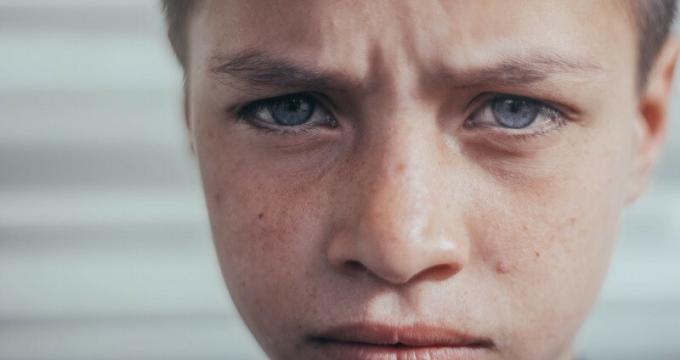Parentification: what is it, types and characteristics of this family problem
The normal thing is that children are cared for by their parents. Among the roles of parents we find being the emotional support of their children, working, cooking, doing housework, variables depending on how old the child is.
It is true that children must learn certain household tasks and help their parents, but this must be done within their possibilities and based on what is expected for their age.
However, there are cases of children and parents who completely reverse their roles, making children act as parents to their own parents, a dysfunctional family dynamic known as parentification. Let's find out what it's about in more detail.
- Related article: "Family therapy: types and forms of application"
When children act as parents
The normal thing is that parents act as caregivers and that their children are cared for by them. Parents are responsible for being the economic, emotional and educational support of their offspring, feeding them, taking them to bed, taking them for a walk or hugging them when they need it.
Although children can help their parents a little, taking responsibility for some tasks, it is normal and healthy that they are given the opportunity to live their childhood without too many responsibilities or, at least, no more than is expected for their age.
Nevertheless, It happens that in some families situations occur and there are circumstances that cause an exchange of roles between parents and children.. Children become the parents of their own parents, performing many or most of the tasks that their parents would be expected to do for them. Children are immersed in a situation in which they have to make what they are not, adults, a phenomenon that they can go very big and, consequently, mark their childhood and leave a trace when they reach the adulthood.
These kids all of a sudden They are forced to become very obedient, attentive children, with a very demanding sense of responsibility for themselves and for others. The more they have to behave like adults, the greater the loss of their childlike innocence. Childhood is stolen from them and, most likely, will lead to emotional wounds that will limit their personal development. These children who act as parents are victims of what child psychologists and psychiatrists call parentification.

- You may be interested in: "Parental neglect: causes, types and consequences"
What is parentification?
The term “parentification” was coined by the Hungarian-American psychiatrist Iván Böszörményi-Nagy, a prominent figure in family therapy. This psychiatrist observed that this phenomenon was very common in dysfunctional families, being an unconscious process by which children they end up becoming the parents of their parents, assuming a degree of responsibilities greater than that which corresponds to them for their age and maturity.
It is defined as an unconscious mechanism because it is seen to be very fueled by a practice very common today, a practice that at first may seem like a good style parental. Today, it is socially accepted to treat children as if they were little adults., in the sense that they are not undervalued as much as in previous times, which makes the little ones see their influence increased in a way spontaneous and, within some levels, educational insofar as they can be given a greater degree of responsibility, a challenge that helps them to growing up.
However, this situation, which in principle is more flattered than criticized, in case of getting out of control or there is little clarity between which are the The roles of the children and which of the parents can degenerate into a dysfunctional situation, an absolute reversal of roles typical of the parentification. In this situation, the little ones are in charge of satisfying the physical or emotional needs of their parents, and taking care of the rest of their siblings..
Parentification can be even more serious if the parents suffer from a mental disorder, especially personality disorders such as narcissistic, dependent or borderline, and mood disorders such as depression and anxiety. The disorder suffered by one or both parents makes it impossible for him to exercise his functions as a father, either because he has a childlike and care-seeking mentality (p. g., narcissistic disorder) or because the symptoms consume him, making it difficult to do the most basic tasks (p. g., depression).
- Related article: "How to set limits for children: 10 tips to educate them"
Types of parentification
Although there are several classifications on the types of parentification, one of the most widespread is that which includes the following two forms of this phenomenon:
1. Emotional
Emotional parentification occurs when parents expect their children to give them emotional comfort, in other words, that they reassure them when they are upset or that they protect them from the emotional consequences derived from their actions. In this way, they turn their children into their emotional support, but making the little ones play an active role in their emotional well-being, attending to their needs.
Despite this, parents who resort to emotional parentification mask this situation after the their children's denial of reality along with the irrational and distorted justification that they do it for its good.
- You may be interested in: "Emotional psychology: main theories of emotion"
2. Physical or instrumental
Physical or instrumental parentification is that situation in which children are expected to take care of household or financial needs, such as preparing food, taking care of other siblings or even working, tasks all of which correspond to parents and never to boys and girls.
Of the two types of parentification, the physical or instrumental is considered the least harmful, except for the situation where children are forced to work because their parents do not see themselves capable of it. As a general rule, the emotional is the most serious for the child's development, since it involves assuming a role that can cause great stress while his emotional needs are neglected as he cannot rely on the adult to support him emotional. The emotional needs of their parents take excessive prominence.
- Related article: "The 8 types of family conflicts and how to manage them"
Consequences of this phenomenon
Although it arises unconsciously and, in many cases, completely naive, parentification is still a disturbing phenomenon for the childhood of any child. It is considered violence and psychological abuse, at least a type of parental neglect. Parenting during childhood has a great impact on the development of identity and personality of the individual, in interpersonal relationships and in relationships with their own children during age adult.
It has been seen that people who were parentalized in their childhood are more likely to develop imposter syndrome in adulthood. This psychological condition is characterized by experiencing deep personal insecurity, even having achieved great achievements and successes, attributing the good that happens not to his effort or know-how, but to mere strokes of luck, factors extrinsic and unrelated to his control.
- You may be interested in: "The importance of the family in mental health"
Does parentification have benefits?
As we have seen when we have arrived here, parentification leaves a profound effect on the adulthood of the person who was a victim in his childhood. His emotional wounds are deep, generating insecurities, fears and the feeling that he never had the opportunity to really be a boy or a girl. These emotional consequences not only affect parentified children once they are adults, but also affect their intimate relationships, their partner and even their own children.
However, there are those who suggest that this phenomenon, let's not forget that it is considered psychological abuse and neglect, could have some benefit in some cases. Parent-child role reversal could be rewarding for the child's safety needsas long as he or she perceives the situation of having to take on more responsibilities as a sign of appreciation and gratitude from their parents.
Some have suggested that higher levels of emotional parentification lead to higher levels of interpersonal competence in some cases. How children learn things that would normally be learned later for their age, develop some independence, skills and abilities without so many obstacles in between, simply because they had to. This could affect their adult life in a positive way, making them better prepared individuals for life and less fearful of having to carry out new responsibilities.
However, despite these supposed advantages that parentification could bring, Everything indicates that the benefits are less than the disadvantages. We must understand that each stage of life has its development guidelines and characteristics, and in the case of parentification these are not respected. Children are children, and they must do childish things. If their childhood is not properly respected, they can end up suffering alterations in physical, emotional, intellectual and social development.
What we can extract from all this is that parentification is one more phenomenon that reminds us of the importance of the bonds between parents and children, how their development can influence throughout all a life. Parentification is a situation typical of a dysfunctional family and, as such, psychological therapy will be required for it to be properly identified and treated. We must think about the health and mental development of children, and make sure that they continue to do what is expected of them, childish things.


